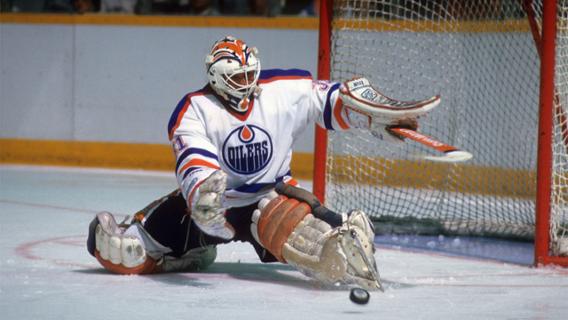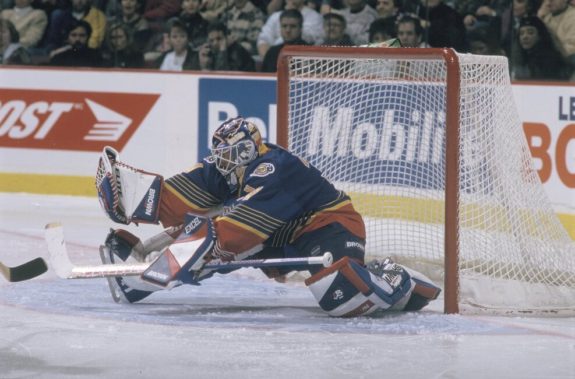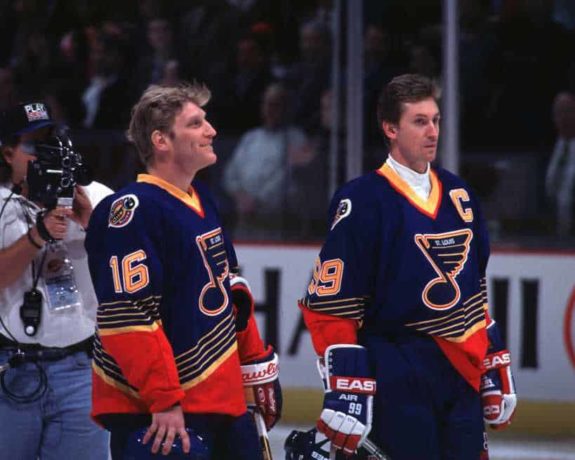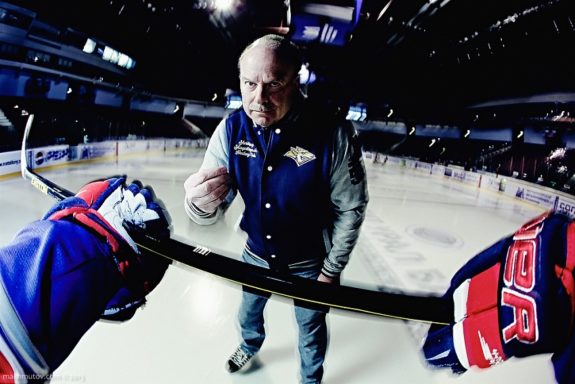In today’s NHL, fans and coaches alike see any goalkeeper who starts 60 games or more as an absolute workhorse. Starting goalies are usually expected to play 45-55 games, unless they are truly at the top of the heap in the league.
20 years ago, goalies starting 60-plus games was more common, but it certainly wasn’t routine. Which makes it even more impressive that in the 1995-96 season, a goalie who had arrived in a new city as a free agent, shown up to training camp overweight, and received a suspension from his head coach went on to set an NHL record by starting 79 games in that season. That goalie was Hall of Famer Grant Fuhr.
Fuhr’s Inauspicious Start
Long before he arrived with the St. Louis Blues, Fuhr had built a reputation as one of the league’s best goalies and a probable future Hall of Fame inductee. He had won four Stanley Cups with the Edmonton Oilers dynasty in the 1980s, as well as a Vezina Trophy in the 1987-88 season and a Jennings Trophy (along with Dominik Hasek) with the Buffalo Sabres in the 1993-94 season. He was also an All-Star six times.

Despite that Jennings Trophy win, when Fuhr hit free agency following the 1994-95 season, he was not a hot commodity. Many in the league believed he was out of shape and past his prime. But the Blues, who had traded Curtis Joseph’s rights to the Edmonton Oilers after the previous season, offered him a two-year contract for $2.1 million.
Alas, the relationship between Fuhr and the team soured immediately at the start of his first season. The veteran goalie showed up to camp overweight and out of shape. The team claimed that he was upwards of 30 pounds overweight, while Fuhr himself said at the time that it was closer to 10 or 15, but admitted he had 20 percent body fat.
Whatever the exact number, the Blues were dissatisfied with Fuhr’s Falstaffian appearance, and notoriously irritable head coach Mike Keenan suspended his goaltender before training camp had even begun in earnest. It seemed like the relationship between the team and its new goalie, and perhaps even Fuhr’s career, was on the verge of ending.
An Incredible Return
Instead of wallowing in anger or self-pity, Fuhr took the suspension as a challenge. He found a fitness guru named Bob Kersee and got himself back into playing shape. He played the Blues’ first game of the regular season, and then he didn’t stop playing.

Fuhr became the shining star of the team very quickly, and he started game after game after game. In fact, he started 10 games in a row to start the season. Then 20. Then 30. By the time he’d reached 50, it was enough of a story for Sports Illustrated to write about Fuhr. Then at the 55 game mark, the magazine asked the goalie if he could start all 82.
If Mike decides I can play all of’em, and this old body lets me, then I’ll play all of ’em,” he said. “I feel pretty good right now, no aches, no pains. I haven’t been this light since my rookie year in Edmonton.”
Fuhr was better than “pretty good.” He was carrying the team. Hall of Fame defenseman Al MacInnis said “we used to sit on the bench and say, ‘Damn, did you see that save?’ But after 50-odd games, we’re tired of saying it.” Brett Hull, another Hall of Fame member, was even more succinct, when asked how the Blues would have been without Fuhr.
We’d have won five games, maybe seven, honest to god.
Brett Hull on how the 1995-96 Blues would have been without Grant Fuhr
Fuhr would go on to start the first 76 games of the season consecutively. He finished the season with 79 games played. Both tallies were NHL records. It is one of the most remarkable regular season performances by any goalie ever, and without him, the Blues likely would not have made the playoffs. Unfortunately, that’s where the story took a tragic turn.
Kypreos Ends Fuhr’s Season
When the Blues entered the postseason, they were as strong a contender as anyone. They had one of the hottest goalies in the league who had carried them through the season. They had a proven head coach who had won the Stanley Cup just two seasons before. And they had an incredible trade deadline addition: “the Great One,” Wayne Gretzky.

But then, disaster struck. The Blues met the Toronto Maple Leafs in the first round of the playoffs. They won Game 1 convincingly, finishing with a 3-1 victory on home ice. But just over nine minutes into the first period of Game 2, everything changed. Fuhr covered a puck and the whistle blew, but as play stopped, Chris Pronger, then in his first season with the Blues, cross-checked Maple Leafs’ forward Nick Kypreos from behind.
Kypreos, appearing to exaggerate the impact of the cross-check, proceeded to collide with Fuhr hard, sending him back into the net. After the ensuing skirmish, trainers assisted Fuhr off the ice, never to return to the game. In fact, it was the end of the goalie’s season. The Blues announced that he had suffered several torn ligaments in his knee and could not return to action. Keenan, not known for defending his players often, was furious.
“[Kypreos] deliberately tried to make contact with him,” Keenan said at the time. “He wasn’t pushed into him as everyone thought he had been… he made direct contact, that resulting in a season-ending injury to a very key and important player on our team. The number one goalkeeper on any team in playoff hockey is paramount to the success of any team. There’s no excuse for it.”

Fuhr would later say that while he believes the hit was deliberate, he doesn’t think Kypreos intended to injure him. Whatever the intent, the result was devastating, and Blues fans are all too hauntingly familiar with the rest of the story. While the team dispatched the Maple Leafs behind new goalie Jon Casey, who had taken part in just nine regular season games before being thrust into Game 2, they would not fair so well in the second round against the Detroit Red Wings.
What Might Have Been…
Steve Yzerman’s double-OT winner in Game 7 to send the Red Wings onto the Conference Final, and particularly the Gretzky turnover that created it, still haunts many Blues fans. But Yzerman may never have gotten that far if Kypreos hadn’t ended one of the most incredible goaltending seasons of all time prematurely.
Fuhr’s career won’t be remembered any less fondly because of that collision. Though he was never quite the same, he went on to start 73 games the following season, and played three more with the Blues. He would spend one more season with the Calgary Flames before announcing his retirement prior to the 2000-01 season.
Fuhr’s number 31 was retired by the Oilers in 2003, the same year he was inducted into the Hockey Hall of Fame. His legacy is secure, and his 79-game performance in 1995-96 is a record that will almost certainly never be broken. But fans in St. Louis will always have a somewhat sour taste in their mouths, wondering what might have been if Kypreos hadn’t hit Fuhr and their team had finished the season with its Hall of Fame goaltender.